All auto-related personal injury claims come with an injury, but did you know there’s also a non-economic component to your case? According to the U.S. Centers for Disease Control (CDC), more than 39.5 million personal injury cases require medical treatment annually
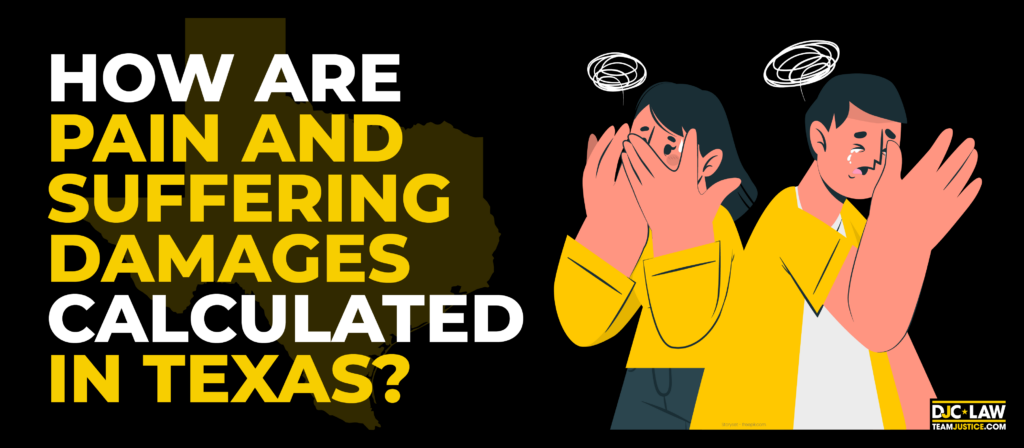
The primary non-economic component of your case is pain and suffering. It accounts for the emotional distress and physical discomfort caused by your injuries. Depending on the calculation method and the strength of your personal injury case, pain and suffering damages could add up to more than half of your eventual settlement.
In this guide, we discuss what pain and suffering is, how it’s calculated, and the role it plays in determining a fair settlement.
Key Takeaways
- Pain and suffering is defined as the physical, mental, and emotional discomfort and distress personal injury victims experience after an accident.
- Texas uses the multiplier method to calculate pain and suffering damages on a scale of 1.5 to 5.
- In Texas, there is no cap on pain and suffering damages, which can represent more than 50% of the total settlement award.
- Attorneys can prove the presence of pain and suffering through medical documentation, expert testimony, personal testimony, photos, and more.
- Types of damages that fall under pain and suffering could include chronic pain, fatigue, depression, reduced quality of life, and long-term disability.
- Hire an attorney to ensure that the full extent of your injuries is known before accepting a settlement because once you accept a settlement, you cannot sue for any further funds.
What is Pain and Suffering?
The University of Cornell defines pain and suffering as physical discomfort and emotional distress, which are eligible for compensation in the form of non-economic damages. Determining what counts as pain and suffering and assigning a dollar figure to it represents one of the most significant points of contention when determining a fair settlement.
Normally, economic damages are simple enough to calculate. For example, if you went to the hospital with a broken leg, you have a clear bill of medical expenses to refer to. Likewise, lost wages can be calculated simply by multiplying your salary by the number of days you missed due to your injury.
Pain and suffering focus on non-economic losses, meaning the things that don’t have a clear monetary value. For example, if you suffered from long-term psychological trauma resulting from your accident, your pain, and suffering could come from the loss of quality of life or the loss of a loved one.
Non-economic damages must be calculated on a case-by-case basis because not everyone experiences the same side effects of an accident. Plus, with IBIS reporting more than 64,000 personal injury law firms in the U.S., it’s pretty standard that every firm will come to different conclusions.
How is Pain and Suffering Determined in Texas?
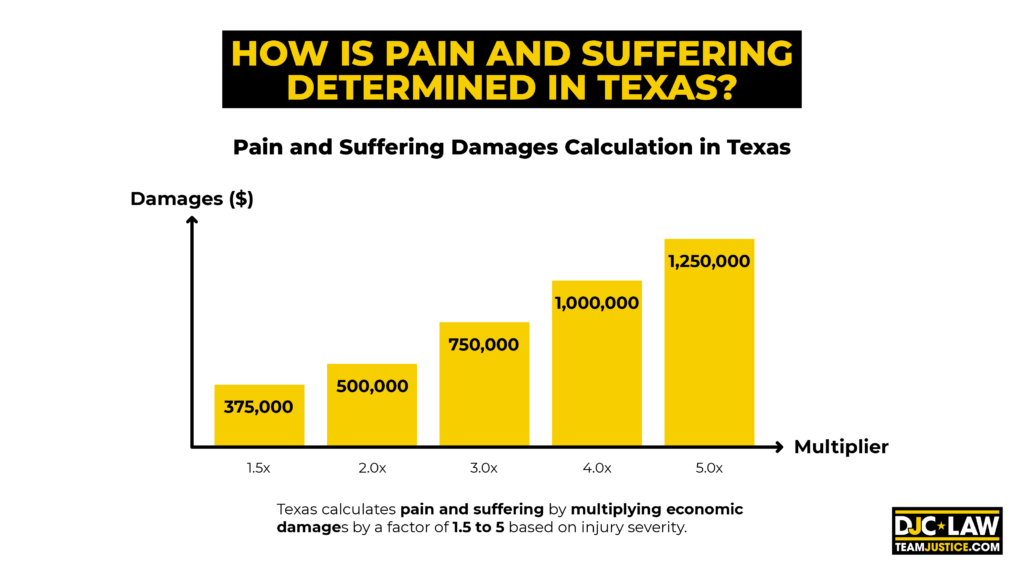
Pain and suffering determinations in Texas typically rely on what FindLaw defines as the “multiplier method.” In essence, all your economic damages are calculated, and then a multiplier of between 1.5 and 5 is used to determine the dollar value of your pain and suffering.
The multiplier is one area that can lead to significant contention. Typically, higher multipliers are used if your injuries are more severe. That’s also how you encounter multi-million-dollar Texas personal injury cases.
For example, let’s say that you suffered life-changing injuries that leave you unable to work or enjoy a high quality of life. If your economic damages, such as medical bills and lost earnings, were $250,000, a multiplier of five might be used, resulting in pain and suffering damages of $1.25 million, with a total settlement of $1.5 million.
What is the Pain and Suffering Multiplier?
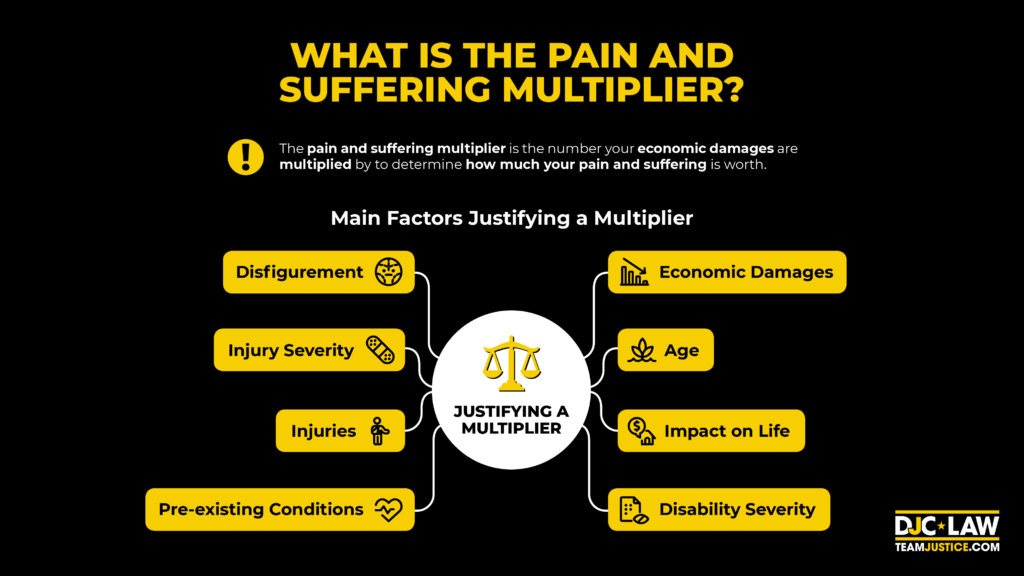
The pain and suffering multiplier is the number your economic damages are multiplied by to determine how much your pain and suffering is worth. In Texas, the multiplier scale ranges from 1.5 to 5, with the latter being reserved for the most severe injuries.
Anyone from an attorney or insurance company to a judge and jury can suggest a multiplier rate, but it must be based on fact. With ASIRT reporting 4.4 million Americans suffering severe injuries from auto accidents annually, it’s easy to see much volatility in the multipliers used.
Generally, the following factors come into play when justifying a multiplier:
- Injury severity
- Your age
- Impact on your life
- Permanent injuries
- Temporary injuries
- Pre-existing conditions
- Severity of disability
- Disfigurement
- Economic damages
Accident victims with a multiplier of 1.5 are considered to have relatively minor injuries, whereas a multiplier of five denotes an extreme level of pain and suffering.
What Can I Claim for Pain and Suffering Damages in Texas?
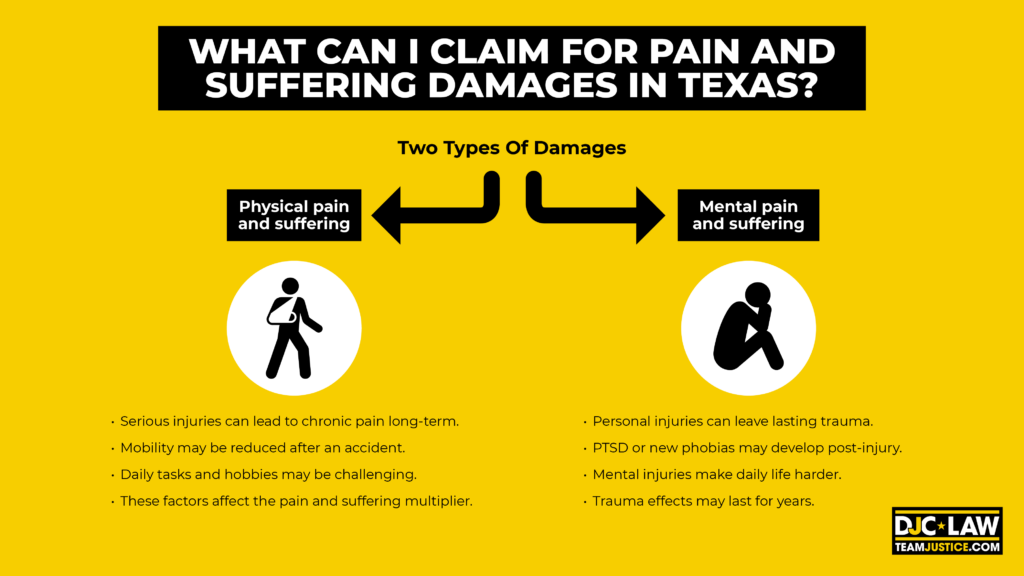
Pain and suffering encompass two types of damage. You can claim for physical pain and suffering and mental pain and suffering. Depending on the type and severity of the injury, you may be able to claim for both types of damages. Consulting an Austin personal injury lawyer can help ensure you receive fair compensation for these damages.
Here’s a rundown of how each category works:
- Physical – Serious injuries often lead to chronic pain and reduced mobility years into the future. This can leave accident victims unable to perform basic tasks or engage in hobbies. These factors will be considered when determining your pain and suffering multiplier.
- Mental – All personal injuries are traumatic incidents that can leave their mark for years to come. For example, you may develop Post-Traumatic Stress Disorder (PTSD) or phobias you never had before. Regardless of the type of mental injuries, you could be left struggling to cope with daily life.
Generally, the more severe your injury and the more significant the impact on your life, the greater the multiplier. For example, if you developed anxiety and depression that made it impossible to return to your job at all, this would be considered a significant contributor to your pain and suffering.
What Damages Fall Under Pain and Suffering?
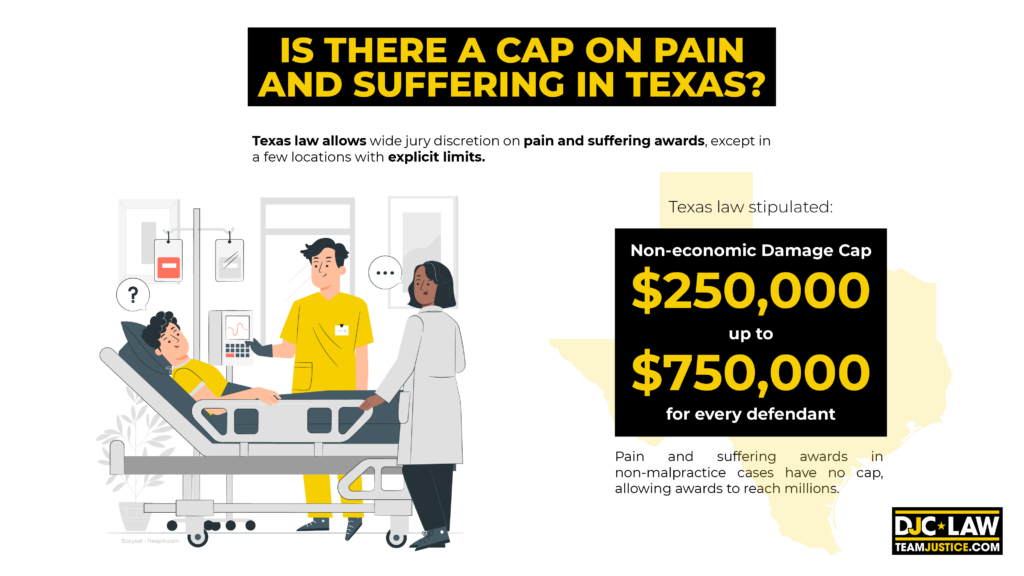
Injuries impact everybody differently. Whereas some may shrug off an accident, others may take years to move on. Pain and suffering damages provide compensation for all forms of physical, mental, and psychological distress and discomfort, as well as the diminishment of your quality of life.
Pain and suffering damages can be used to provide compensation for:
- Reduced physical capacity
- Chronic physical pain
- Exhaustion
- Anxiety and depression
- Diminished sexual capacity
- Loss of memory
- Loss of cognitive function
In short, anything that takes away from your life and your future could be considered when determining pain and suffering damages.
How to Prove Pain and Suffering in Texas
Proving pain and suffering is evidence-based, meaning you must provide documentation and professional opinions on how much your injuries have impacted your life. Robust evidence is necessary to prevent insurance companies from attempting to minimize your injuries and their impact.
Examples of evidence a personal injury attorney might use to prove pain and suffering include:
- Medical Evidence – Medical documentation like psychiatric treatment, prescriptions, procedures, and doctor’s appointments paint a picture of the medical interventions you’ve required since the accident.
- Loss of Enjoyment Evidence – Evidence that you’ve had to drop out of activities since your accident. For example, perhaps you’re no longer a member of your running club because your injuries prevent you from running.
- Photo and Video Documentation – Any photo or video evidence could help to prove your pain and suffering.
- Missed Work – Evidence of missed work isn’t just helpful in calculating lost wages and earnings potential. Still, it can also strengthen a pain and suffering claim, especially if you consider your carer a core part of your life.
- Personal Testimonies – Testimonies from family and friends prove how your injuries have changed you physically, emotionally, and mentally.
- Expert Testimonies – Medical professionals who have treated you can also provide testimonies. These experts may include but are not limited to counselors, doctors, and psychiatrists.
Practically anything can be used to prove your pain and suffering. For example, cases have been won in the past based on the fact that the accident victim has kept a journal detailing the symptoms and feelings since the accident.
Is There a Cap on Pain and Suffering in Texas?
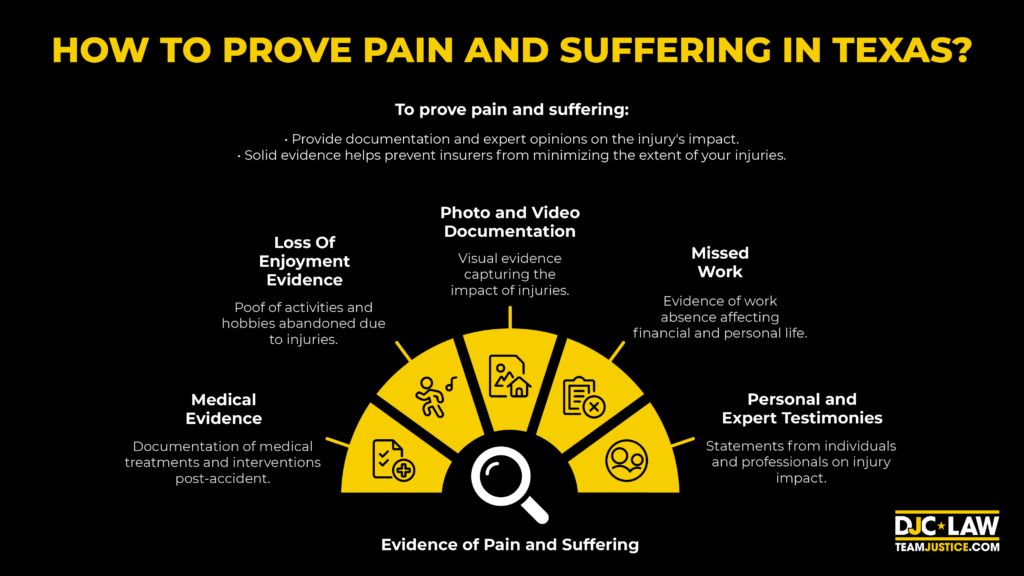
Texas law has little to say about caps on pain and suffering awards. Juries have a tremendous amount of discretion in non-economic awards, except in a few locations where pain and suffering damages are explicitly limited.
However, one type of personal injury where there is a legal cap is medical malpractice cases. Since 2003, Texas law has stipulated that the non-economic damage cap is $250,000 for every defendant, up to a maximum of $750,000. If you’re pursuing a medical malpractice case, your maximum pain and suffering award is $750,000.
Outside of medical malpractice cases, other personal injuries have no caps attached, which is why pain and suffering awards could easily step into the millions.
What is an Example of a Pain and Suffering Settlement in Texas?
Pain and suffering often fall to subjective judgment, meaning the range of compensation awarded is enormous. For example, a minor injury consisting of temporary pain and no long-term effects could see an award of $10,000. On the other hand, long-term disability may lead to $100,000 or more.
For example, say that you have a car accident victim who sustained $20,000 in economic damages because of their medical bills and missed days at work. If their car accident attorney chooses a multiplier method of three, their pain and suffering award will amount to $60,000, for a total of $80,000.
In rare cases, the Per Diem method may be used over the multiplier method. Per Diem means each day of your suffering receives a dollar value. Generally, using a multiplier is the standard way of doing things in the Lone Star State.
How much could you be entitled to? Unfortunately, looking at the averages is pretty pointless because the numbers are heavily influenced by a few highly lucrative cases. For example, the Lawsuit Information Center found that the average personal injury lawsuit verdict was worth $826,892, but this clearly isn’t a reasonable expectation for most plaintiffs.
Is Pain and Suffering Compensation Taxable?
Personal injury lawsuit awards generally don’t count as taxable income, based on the current interpretations of the IRS, as outlined by the Internal Revenue Code (IRC) Section 61. Pain and suffering are classified as non-taxable income in the same way as economic damages.
The myth surrounding pain and suffering compensation comes from the fact that certain types of awards are considered taxable income because they are categorized as financial gain. However, the IRS views pain and suffering as an award designed to make the victim “whole” again rather than a genuine financial gain.
On the other hand, your settlement may still contain a taxable component. For example, punitive damages, lost wages, and medical costs that were previously deducted are types of awards that could be taxable.
What to Know Before Agreeing to a Settlement
Consider the full extent of your injuries before agreeing to a settlement. Once you agree to a settlement, you cannot reopen the case by suing the liable party for more money. That’s why the number one aspect of agreeing to a settlement is ensuring a fair amount.
You’ll likely receive a settlement offer a few weeks after your accident. Be suspicious of early settlement offers, as it’s usually a way for an insurance company to lowball you. That’s why your first course of action should be to hire an attorney who can use their experience to determine whether you’re receiving a fair offer.
Consider Not Negotiating a Settlement Until You Know the Extent of Your Injuries
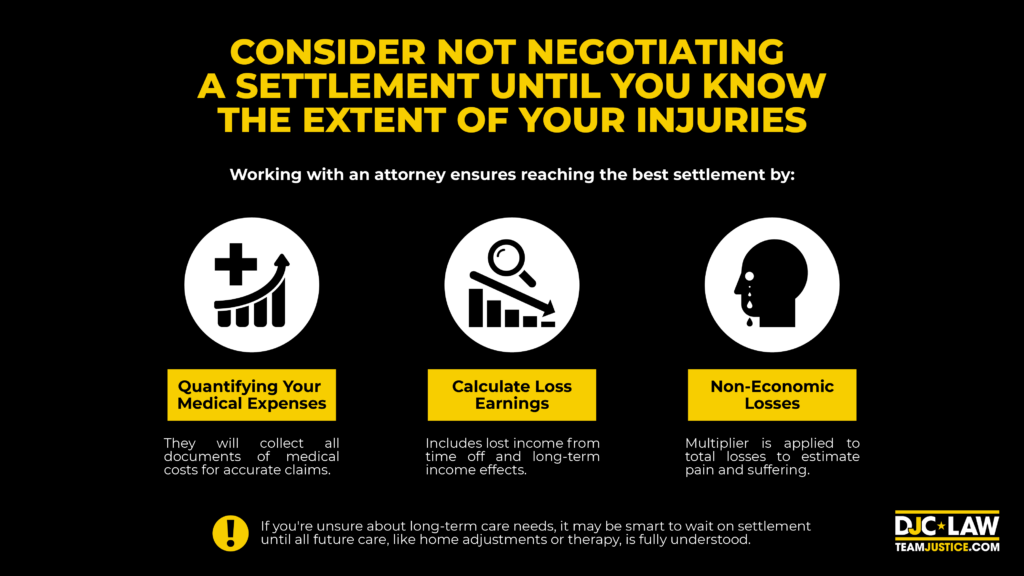
Negotiating a settlement too early can mean not getting the complete picture of your injuries. Since the multiplier method for pain and suffering is crucial, your economic damages are just as significant as your non-economic damages.
Working with an attorney ensures that the full extent of your injuries is known before negotiating a settlement by:
- Quantifying Your Medical Expenses – They’ll collect all documents relating to your medical costs, including invoices, receipts, and billing statements from all medical providers.
- Calculate Lost Earnings – If you had to take time off work, your attorney will factor in the income you lost. Plus, serious injuries will be accounted for if they damage your future earnings capacity.
- Non-Economic Losses – Your pain and suffering losses will be calculated by choosing a suitable multiplier and then using it to calculate your total economic losses. This is why reviewing all your injuries is so critical because they could change the multiplier or alter the base economic figure that’s been multiplied.
Note that you may choose to hold out on accepting a settlement if you’re still unsure about whether you’ll need long-term care for illnesses or injuries. This includes home modifications, future services, and mental health therapy.
Be Aware of Hospital Liens and Subrogation Claims
Your total settlement award could be reduced due to medical liens and health insurance subrogation. Medical liens are demands for repayment from your medical provider, whereas subrogation is where your health insurer demands repayment for your medical debts.
Liens and subrogation claims may appear during your personal injury lawsuit because you received treatment before you received your settlement. Medical providers often accept liens if you’ve got a high chance of winning your case, but all medical debt must be repaid.
Your pain and suffering award forms part of your total settlement, meaning you may have to use part of your award to cover your unpaid medical debt. On the other hand, liens can often be renegotiated later, meaning you might not have to pay the total amount of the lien.
What Role Does a Personal Injury Lawyer Play in These Cases?
Hiring a personal injury lawyer to fight your case maximizes your potential award by establishing negligence, proving your injuries, and demonstrating your pain and suffering. Your attorney performs various functions, including gathering evidence, leading negotiations, representing you in the legal system, and providing specialized expertise.
Pain and suffering is often subjective and challenging to prove, which is why insurers often attempt to minimize injuries and the impact they have. Your lawyer’s job is to prove that you’re entitled to a specific amount for your pain and suffering.
The primary functions of your lawyer in these cases include:
- Gathering all appropriate evidence to prove your pain and suffering.
- Negotiating with the defendants who will do everything in their power to attack your position.
- Representing you at every stage of the process, from initial negotiations to court trials.
- Advising you on whether a settlement is fair, the merits of your case, and your estimated chances of success.
- Pursuing the maximum amount of financial compensation by proving the genuine reality of your pain and suffering.
Medical costs and property damage are relatively easy to prove, but cases get complicated when pain and suffering come into play. Give yourself the best chance of success by hiring a Texas personal injury attorney today.
Why You Should Seek Legal Help for Your Pain and Suffering Claim
Pain and suffering claims are easy to deny because they’re so challenging to prove. That’s why you require a lawyer with the knowledge and skill to build a robust case and navigate the legal process.
Many people choose to pursue their cases alone because they believe that hiring an attorney is a waste, but this isn’t true. According to Nolo, people who hired a lawyer obtained an average of $77,600 in compensation, compared to the $17,600 who fought their own cases.
In short, the numbers don’t lie. Hiring a lawyer could increase your compensation award by four or five times as much, meaning it’s always a positive investment. Furthermore, the contingency-based fee system most lawyers work on means that if you don’t get paid, you don’t pay anything, so it’s a risk-free endeavor.
Furthermore, it’s impossible to underestimate the benefit of peace of mind when pursuing these types of claims. All personal injury cases are traumatic, and hiring an attorney gives you the breathing room needed to concentrate on putting your life back together.
Pain and Suffering Damages FAQs
What is the purpose of pain and suffering damages?
Economic damages provide you with compensation for the money you lost directly through your accident. However, pain and suffering damages compensate for the anguish you experienced after an accident. This anguish can be physical, mental, or emotional.
How is pain and suffering calculated?
No scientific method exists for calculating the extent of someone’s pain and suffering – although some insurers have tried to implement custom models over the years. Every personal injury claim is unique, meaning that each victim’s pain and suffering is also unique.
The most widely used system for calculating pain and suffering in Texas is the multiplier method, which uses a number between 1.5 and 5 multiplied by your economic damages.
What is evidence for pain and suffering?
Proving pain and suffering can happen in any number of ways, but it’s not as simple to prove as an ordinary physical injury, such as a broken arm. Your attorney will explore various avenues, including input from your medical team, testimonies from people who know you, and evidence from aspects of your personal life, including photos, videos, and personal journals.

